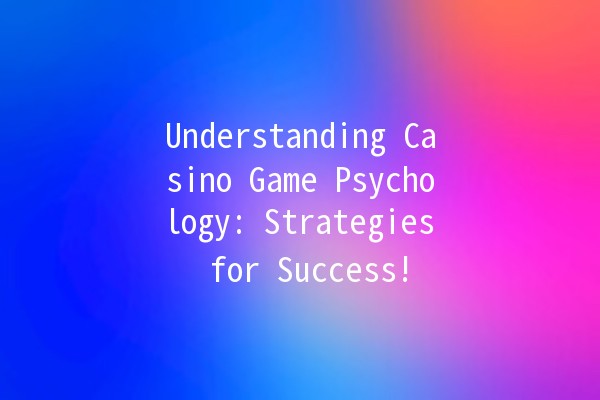In the world of gambling, casino games are designed not just for entertainment but also to encapsulate psychological elements that influence player behavior and decisionmaking. Understanding casino game psychology can not only enhance your gaming experience but also provide insights into making better choices at the tables. This article delves into the core aspects of this fascinating field and equips you with helpful tips to navigate casino environments effectively.
The Intrigue of Casino Game Psychology
Casino game psychology focuses on how people think, behave, and react while playing different games within a casino. Strategies employed by casinos leverage our cognitive biases, social behaviors, and emotional responses, ultimately shaping how we interact with the gaming environment. This psychological manipulation is deliberate, designed to keep players engaged longer and encourage spending.
Common Psychological Principles in Casino Games
Casinos use various psychological principles to enhance the gaming experience:

Effective Strategies to Enhance Your Casino Experience
By understanding these psychological strategies, players can apply specific techniques to navigate the gaming environment and improve decisionmaking. Here are five effective tips for enhancing productivity while playing casino games.
What It Is: Establishing a budget before you start playing will help mitigate the risks associated with loss aversion.
Application Example: If you plan to spend $100 on a gambling session, stick to this limit using cash or a prepaid card. This approach ensures you are less likely to chase losses and makes you more mindful of your expenditures.
What It Is: Acknowledging the psychological impact of near misses can prevent irrational decisionmaking based on perceived potential for winning.
Application Example: Instead of continuing to play after a near miss, remind yourself that it is a random occurrence and can often lead to further losses. Setting predefined win and loss limits can help you walk away without falling victim to the allure of "almost winning."
What It Is: Step away from the gaming table or machine periodically to reset your mental state.
Application Example: Set a timer to remind you to take a break every 45 minutes. Use this time to stretch, hydrate, and refocus your mind. This technique will enable you to make more rational decisions rather than letting emotions dictate your gameplay.
What It Is: Knowing the effects of ambient influences can help you manage your time and enjoyment level effectively.
Application Example: If you notice you are feeling overwhelmed by the buzz of the casino, consider playing in less crowded areas or during offpeak hours when the environment may be less stimulating.
What It Is: Not all games are created equal; choose games that suit your style while also considering house edge and variance.
Application Example: Conduct research on different games and their odds before playing. If you enjoy games that require skill, such as poker, study strategies and practice to improve your chances. If you prefer slots, identify machines with favorable payout percentages.
Frequently Asked Questions
To avoid getting swept up in the thrill of winning, establish a rule for yourself: set win limits. Decide beforehand how much you wish to win and leave when you reach that threshold. Additionally, practice mindfulness techniques to recognize when emotions are clouding your judgment during gameplay.
If you find yourself chasing losses, take a step back. Reflect on why you began playing and remind yourself of your predetermined budget. Engage in a nongambling activity that you enjoy, such as dining or watching a show, to shift focus away from the tables.
Yes! In poker, understanding opponent behavior—recognizing ‘tells’—can provide a significant advantage. Observing how players react emotionally and strategically can help you make informed bets and folds. Additionally, controlling your own emotional responses is crucial. Use breathing exercises to remain composed.
Time spent at the casino varies by individual preference. However, it is advisable to limit sessions to 23 hours to maintain focus and avoid fatigue. This will also give you a better chance to stick to your budget and make sound decisions.
Social interaction adds an exciting dimension to gambling, as it fosters a sense of community and camaraderie. However, it can also lead to peer pressure. Be aware of which connections influence your gambling behaviors, and choose to associate with individuals who promote responsible gaming.
Absolutely. Understanding the psychological aspects of gambling can empower individuals to recognize signs of addiction and seek help. Support groups, counseling, and embracing selfawareness play critical roles in recovery and resilience.
Understanding the Psychology Behind Your Game Choices
Engaging with casino games isn't just about luck; it’s an intricate dance between psychology and strategy. By employing the techniques discussed above, you can balance enjoyment and awareness, ultimately enhancing your experience at the casino. Remember, the key to successful gameplay lies in understanding the game’s context, human behavioral patterns, and maintaining mindful control over your decisions. Embrace these insights, and let them guide you towards a more rewarding and fulfilling gaming experience!